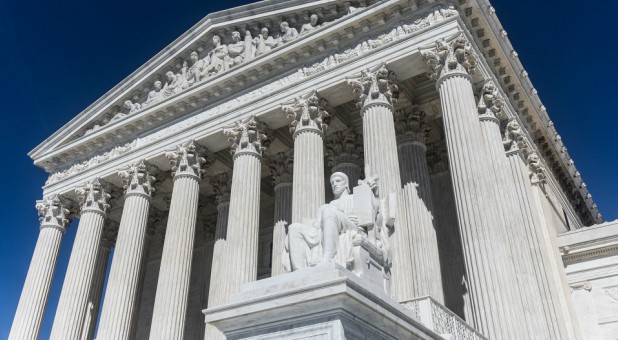After the Supreme Court ruled last week 6-3 that there is no constitutional right to abortion, pro-life supporters cheered while angry pro-choice activists took to the streets to denounce the decision. Abortion advocates carried placards and shouted slogans such as “Not Your Body, Not Your Choice,” “No Uterus, No Opinion” and “No Forced Births,” along with a lot of vulgar slogans that I can’t print here.
One sign I saw in last week’s protests said “Get Your Rosaries Off My Ovaries,” echoing the concern that the high court ruled against abortion because the majority of Supreme Court justices are Roman Catholics. Many protesters also claimed that the court’s overturning of the Roe v. Wade decision was the work of “white males”—a strange view considering Justice Clarence Thomas is a Black man and Justice Amy Coney Barrett is a white woman.
The decision in Dobbs v. Jackson Women’s Health Organization, officially handed down on June 24, essentially says abortion is not a federally protected right, and it gives states the power to regulate abortion as the governments of those states decide. That means Oklahoma can stop all abortions after six weeks of pregnancy; Georgia can limit abortions after a heartbeat is detected; and New York can allow an abortion up until the baby is full-term in some cases.
The Supreme Court didn’t rule that abortions can’t happen in the United States. Right now, abortion is protected in California, Colorado, Connecticut, Delaware, Hawaii, Illinois, Maine, Maryland, Massachusetts, Minnesota, Montana, Nevada, New Hampshire, New York, Oregon, Rhode Island, Vermont and Washington—but states can enact restrictions if their legislatures choose to do so. (Voters in Kansas will vote on the matter in August.)
What the High Court said in Dobbs is that the founders of the United States did not guarantee a constitutional right to end the life of an unborn child. That means the debate over abortion will continue for months and years, and people will have to decide what they believe about when life begins in the womb, and whether an unborn baby has a right to life.
Pro-abortion advocates claim that any restriction on abortion is rooted in religion, and a lot of anger is aimed at the six Supreme Court justices who upheld the majority opinion in Dobbs. Five of those six are Catholics: Samuel Alito, Amy Coney Barrett, Brett Kavanaugh, Clarence Thomas and John Roberts. Justice Neil Gorsuch was raised Catholic, but he is now an Episcopalian. Of the dissenting justices, Elena Kagan and Stephen Breyer are Jews, and Sonia Sotomayor is Catholic.
Abortion is a tricky issue, since obviously we should always be concerned about the life of the mother as well as the child. But it’s not fair to say that laws that restrict abortion are invalid because they are rooted in religious belief. “Get Your Rosaries Off My Ovaries” is not a solid argument for three reasons:
1. Laws are rooted in moral absolutes. The Bible does say: “You shall not steal” (Exod. 20:15). But laws against shoplifting, looting or any other form of theft are not “religious.” The government doesn’t impose religion on anyone when a police officer arrests a thief. Laws against stealing are necessary for a healthy society, and without them we end up with lawlessness. The Bible also says lying is a sin; but when someone tells a lie in a courtroom, it’s not “imposing religion” to convict that person of perjury. Even atheists agree that theft and perjury are crimes.
2. We have laws on the books that protect unborn children. In 2004 President George W. Bush signed into law the Unborn Victims of Violence Act, which recognizes that a fetus in utero is a legal victim if it is killed or injured when a violent crime is committed. For example, if a husband kills his pregnant wife, and the unborn child dies, the assailant is charged with double homicide. This is not the “imposition of religion”; lawmakers across the country agree that if an unborn child dies in a crime, it is considered the loss of a human life.
3. Limiting abortion isn’t about forcing anyone to believe a religious doctrine. We have freedom of religion in this country, which means I can’t force an atheist to believe in Jesus or participate in Christian communion. But in a civil society where all life is valued, it is reasonable for us to enact laws that protect people—especially the most vulnerable. Unborn children certainly deserve the protection of the law.
Proponents of abortion are always quick to say: “It’s a woman’s right to choose.” I’ve spent most of my adult life helping women and girls in poor countries find protection from domestic abuse, economic oppression and denial of education. We should certainly care more about women’s rights than we do. But the abortion issue is not just about women; it’s also about the 62 million unborn children, male and female, who have died in abortions in this country since Roe v. Wade was enacted in 1973. Regardless of what people believe about God, or rosaries, they should care that the unborn have had no voice in this debate.
J. Lee Grady is an author, award-winning journalist and ordained minister. He served as a news writer and magazine editor for many years before launching into full-time ministry. Lee is the author of six books, including 10 Lies the Church Tells Women, 10 Lies Men Believe and Fearless Daughters of the Bible. His years at Charisma magazine also gave him a unique perspective of the Spirit-filled church and led him to write The Holy Spirit Is Not for Sale and Set My Heart on Fire, which is a Bible study on the work of the Holy Spirit.












































